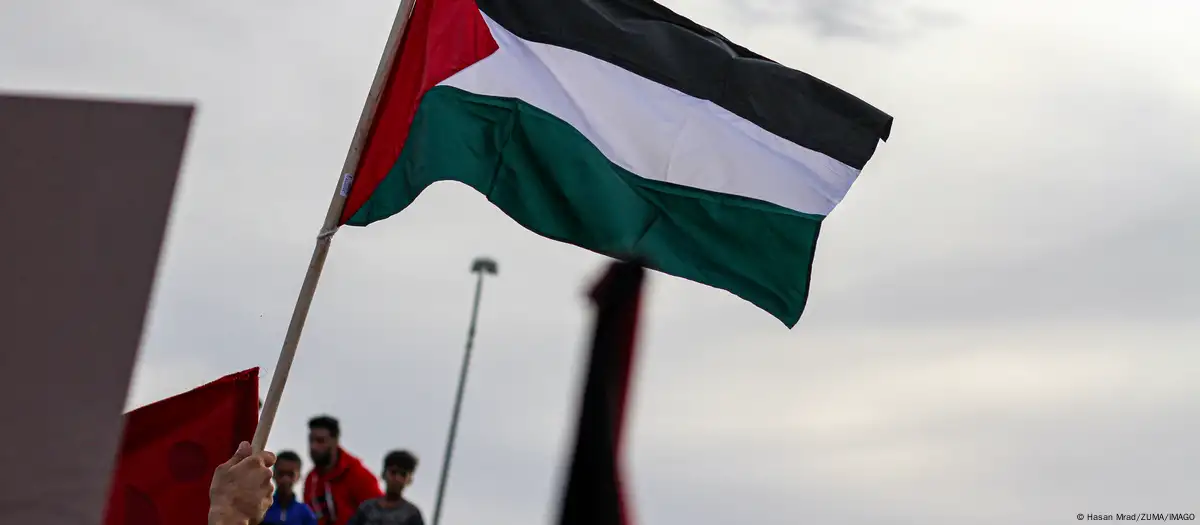
Several European countries, including the United Kingdom and France, are recognizing the Palestinian state under protests from Israel. Experts explain that gesture is above all symbolic and should be accompanied by practical measures.
The United Kingdom, Canada and Australia became this Sunday (21/09) the first great western nations to recognize a Palestinian state, followed by Portugal. The four countries announced the measure just before the start of the UN General Assembly began in New York on Monday. Other Western nations intend to follow the example during the event, despite Israeli protests.
In parallel to the UN General Assembly, France and Saudi Arabia will organize in New York a meeting to press the resumption of the solution of two states (in which an Israeli state and a Palestinian coexist in peace) as the only answer to this conflict of decades.
During this meeting, several countries, including France itself, but also Belgium, Luxembourg, Andorra, San Marino and Malta, will join the more than 145 UN members who already recognize a Palestinian state, according to the previous announcement of the Elisha Palace.
Source: AFP – DW | On September 21, 2025
Most of the recent European statements on the recognition of the Palestinian State are a result of the Israeli military campaign in Gaza, which has already killed more than 65,000 people, according to the Hamas Government Ministry of Health. Last Monday, a UN Human Rights Council commission accused Israel of committing genocide in Gaza.
Israel and its main ally, the United States, rejected this report and any plans to recognize a Palestinian state with the argument that this would be a reward for terrorism, in reference to the terrorist attacks of October 7, 2023 against Israel, led by the Palestinian Radical Group, which resulted in the death of almost 1,200 people and preceded the Israeli military campaign in Gaza.
Only “performative actions”
Even Palestinian state supporters say recognition is insufficient if not combined with actions. “Western states adopt symbolic gestures, while Palestinians run out of justice and without a functional state, only with an increasing gap between lived reality and international gestures,” argued the Palestinian Institute for Public Diplomacy, based in Ramallah, in an article for the Palestinian Think Tank al Shabaka.
On Wednesday, columnist Owen Jones of the British newspaper The Guardian wrote that “all actions taken against Israel were performative in order to stifle the appeals by public opinion.”
There is also the question of how Israel will react to the new wave of recognition. “Prime Minister Benjamin Netanyahu has a long history of challenging other UN members,” wrote analyst Richard Gowan, a United Nations expert at Think Tank International Crisis Group in the American political journal Just Security.
“A scenario that worries the diplomats is that Netanyahu – which he said last week that ‘there will be no Palestinian state’ – can respond to the recognition process by announcing, in his speech, plans to formally attach parts of the Palestinian territories.”
It is evident that the recognition of a Palestinian state by itself will not end the war in the Gaza Strip. “Recognition is a misrepresentation for boycott and punitive measures that should be taken against a country that perpetuates genocide,” argued columnist Gideon Levy in the Israeli newspaper Haaretz in August. “Recognition is just an empty statement.”
In fact, as legal experts point out, these are two distinct questions. Whether Palestine is a state or not, international law obliges other nations, in the face of suspicion of a genocide, to do everything they can to prevent it.
Important symbolism
What the recognition of a Palestinian state can bring is the strengthening of the defense of a ceasefire within the scope of international diplomatic, bureaucratic and legal structures.
In the academic journal The Cairo Review of Global Affairs, Egyptian political analyst Omar Auf pointed out that Palestinian authorities had already tried to join Geneva Conventions in 1989, but were rejected by Switzerland because, according to the Swiss, there was uncertainty about the existence of a Palestinian state.
Nomi Bar-Yacov Peace Negotiations expert at the Geneva Security Policy Center told DW that recognition nothing changes immediately. “But it gives the Palestinians a much greater participation in negotiations, because when negotiating state before state is not the same as negotiations between a state and an unrecognized state or that is just an entity.”
Recognition by other countries can be seen as a diplomatic appreciation. Those who recognize the Palestinian state also need to review their relations with Palestine, as well as the associated legal obligations. This can lead to a review of relationships with Israel.
All of this, however, has a very symbolic character, observes analyst Hugh Lovatt of the European Foreign Council (ECFR). “Symbolism is not necessarily bad. If it is considered who is recognizing-France and the United Kingdom, in particular-it is an important reaffirmation of the rights and the self-determination of Palestinians, the right to live free from occupation, the right to sovereignty and so on.”
“[O reconhecimento] It should be seen as the trip of the trip, ”said Lovatt.“ We may not get there tomorrow, but the trajectory is clear. ”
Practical measures
But symbolic measures should be accompanied by practical measures. “Recognition is not political, it is a beginning. The real work begins the next day,” said political analyst Anas Iqtait of the Australian National University, in an article for the Think Tank Middle East East Council on Doha.
In Brussels last Wednesday, the head of European diplomacy, Kaja Kallas, encouraged member countries to increase tariffs on some Israeli products and to sanction Israeli settlers and two ministers of state, the finance, Bezalel Smotrich, and national security, Itamar Ben-Gvir, both of the Israeli ultra-right.
These are measures that ECFR experts had already recommended. A source in Brussels told DW that Italy, which has always opposed the interruption of EU scientific funding to Israel, could soon abandon its objections.
Originally published by DW on 09/22/2025
Por Cathrin Schaer
Source: https://www.ocafezinho.com/2025/09/22/o-que-o-reconhecimento-do-estado-palestino-significa/

